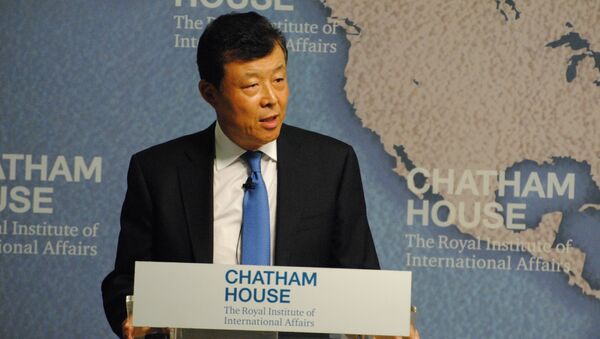The United Kingdom summoned the Chinese ambassador to Britain, Liu Xiaoming, to express "deep concerns" over the newly-adopted national security law for Hong Kong, Sky News reported.
The Foreign Office permanent under-secretary, Sir Simon McDonald, reportedly met with Liu to echo UK PM Boris Johnson's and Foreign Secretary Dominic Raab's claims that the law breached the 1984 Sino-British Joint Declaration, providing Hong Kong with autonomy until 2047.
According to Sky News, the meeting marked the second time a Chinese ambassador has been called to the Foreign Office regarding Hong Kong since 1984.
Following the adoption of the HK Security Law, the United Kingdom expressed dissatisfaction with the move, with PM Johnson denouncing the legislation as breaching the Sino-British Joint Declaration. The ambassador tweeted that "UK has no sovereignty, jurisdiction or right of “supervision” over Hong Kong whatsoever", and stressed that Hong Kong issues are China's internal affair alone and no business of the outside world's.
#HongKong is part of China and Hong Kong affairs are China's internal affairs. The UK has no sovereignty, jurisdiction or right of “supervision” over Hong Kong whatsoever. Gone are the days when Hong Kong were under British colonial rule. https://t.co/Ncs0v3UTEZ
— Liu Xiaoming (@AmbLiuXiaoMing) July 1, 2020
Earlier, the United Kingdom, in response to the new security law, offered UK citizenship rights for nearly 3 million British Nationals Overseas (BNO) in Hong Kong and their immediate families, providing them rights to live in the UK for five years and then apply for settled status and citizenship.
However, former Chinese leader Deng Xiaoping's translator, Victor Gao, cited by Sky News, expressed doubt that the British government would follow through on its promise, suggesting that "they didn't do it in 1997 and I don't think they'll do it now". He also noted that, in a comparison between Britain and Hong Kong, residents of the latter would choose to stay because Hong Kong is "a good place to do business, [with] very low taxes".
On behalf of over 50 countries, Cuba welcomed China's imposition of its national security law against terrorism, subversion and secession on Tuesday. A joint statement to the UN Human Rights Council supported China's "reaffirmation of adherence to 'One Country, Two Systems' guideline".
Amid criticism from opposition activists claiming that the guidelines are breached by the law, and condemnation from several other nations, including the United States, Beijing reiterated that Hong Kong is the internal affair of Beijing and not subject to foreign interference.


